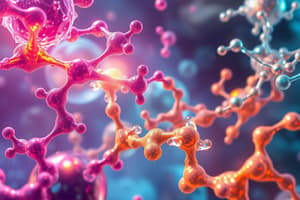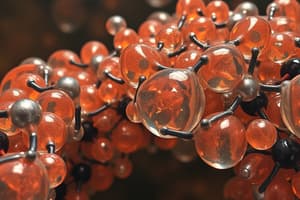Podcast
Questions and Answers
What are the 6 most important elements?
What are the 6 most important elements?
- Carbon, Hydrogen, Oxygen, Nitrogen, Phosphorus, Sulfur (correct)
- Helium, Neon, Argon, Krypton, Xenon, Radon
- Sodium, Calcium, Chlorine, Magnesium, Iron, Zinc
- Gold, Silver, Copper, Iron, Lead, Mercury
What are the 4 macromolecules?
What are the 4 macromolecules?
- Fats, Oils, Waxes, Glycogen
- Carbohydrates, Lipids, Proteins, Nucleic Acids (correct)
- Glucose, Fructose, Sucrose, Lactose
- Vitamins, Minerals, Proteins, Carbohydrates
What elements are found in carbohydrates?
What elements are found in carbohydrates?
Carbon, Hydrogen, Oxygen
What elements are found in lipids?
What elements are found in lipids?
What elements are found in proteins?
What elements are found in proteins?
What elements make up nucleic acids?
What elements make up nucleic acids?
What does monosaccharide mean?
What does monosaccharide mean?
Which macromolecule has a fatty acid tail?
Which macromolecule has a fatty acid tail?
Which macromolecule is a mono, di, or polysaccharide?
Which macromolecule is a mono, di, or polysaccharide?
What macromolecule is DNA and RNA?
What macromolecule is DNA and RNA?
What macromolecule is found in potatoes, pasta, and rice?
What macromolecule is found in potatoes, pasta, and rice?
What macromolecule doesn't mix with water?
What macromolecule doesn't mix with water?
What do carbohydrates contain?
What do carbohydrates contain?
What do proteins have?
What do proteins have?
What macromolecule makes up the cell membrane?
What macromolecule makes up the cell membrane?
What macromolecule is used for short-term energy?
What macromolecule is used for short-term energy?
What do proteins function in?
What do proteins function in?
What do nucleic acids contain?
What do nucleic acids contain?
What do lipids have?
What do lipids have?
What macromolecule provides short-term energy?
What macromolecule provides short-term energy?
What macromolecule is used for long-term energy storage?
What macromolecule is used for long-term energy storage?
What do lipids do?
What do lipids do?
What are some examples of lipids?
What are some examples of lipids?
What macromolecule is in a form of a circle?
What macromolecule is in a form of a circle?
Flashcards are hidden until you start studying
Study Notes
Essential Elements (CHNOPS)
- Key elements vital for life: Carbon, Hydrogen, Oxygen, Nitrogen, Phosphorus, Sulfur
- These elements are fundamental in constructing biological macromolecules.
Macromolecules Overview
- Four primary macromolecules: Carbohydrates, Lipids, Proteins, Nucleic Acids
- These molecules play crucial roles in structural and functional processes in living organisms.
Carbohydrates
- Composed of Carbon, Hydrogen, and Oxygen
- Includes mono-, di-, and polysaccharides.
- Functions include short-term energy storage (e.g., in potatoes, pasta, and rice).
- Often represented in a cyclical form.
Lipids
- Made of Carbon, Hydrogen, and Oxygen; non-polar and do not mix with water
- Fatty acid tails characterize lipids, essential components of cell membranes.
- Serve multiple functions: long-term energy storage, insulation, and protection.
- Include substances like oils, waxes, blubber, and butter.
- Examples include cholesterol and testosterone.
Proteins
- Composed of Carbon, Hydrogen, Oxygen, Nitrogen, and Sulfur
- Play critical roles in hormones, structural support, and catalyzing biochemical reactions.
Nucleic Acids
- Contain Carbon, Hydrogen, Oxygen, Nitrogen, and Phosphorus
- Key macromolecules include DNA and RNA, central to genetic information storage and transfer.
Studying That Suits You
Use AI to generate personalized quizzes and flashcards to suit your learning preferences.




